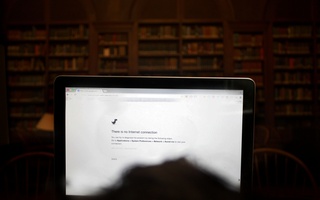UPDATED: April 24, 2012, at 9:03 p.m.
In an effort to improve wireless internet access in some of the campus’ weakest hot spots, Harvard University Information Technology will install a new wireless core and 4,000 wireless access points by September, according to HUIT Executive Director of Infrastructure Jacques N. Laflamme.
“The plan is to improve performance, availability, and density across campus,” Laflamme wrote in an email. “There will be ongoing work beginning with commencement through the fall with the initial focus being the freshman dorms and selected classrooms.”
As part of this Wireless Improvement Project, the Undergraduate Council conducted a survey along with HUIT to identify places with inconsistent wireless internet access. The survey, which garnered 175 responses from students, found that Lowell Lecture Hall, Sanders Theatre, and Sever Hall were most frequently cited for connectivity problems.
According to HUIT’s chief technology officer, computer science professor James H. Waldo, both Lowell Lecture Hall and Sever had previously been identified as potential dead spots, but plans for installing new WiFi access points were never approved by administrators.
Sixty-seven students who took the survey identified Lowell Lecture Hall as a problem area. One respondent wrote, “No WiFi in Lowell Lecture Hall or basement. Ever. It is the worst.”
The three locations, along with several freshman dorms, had already been listed as priority locations for the Wireless Improvement Program.
“The results didn’t surprise us particularly,” said Waldo. “What the survey really helped us with was setting relative priority for these locations by the number of students that complained about them.”
But the identification of dead spots is only the first step in a lengthy process. Laflamme said that due to issues of historical preservation and the realities of the buildings’ existing infrastructure, certain buildings on campus cannot easily undergo the renovation necessary for improving WiFi access. Waldo said that budgetary concerns will also affect the progress of the WiFi improvement process.
“HUIT is, at times, like an engineering organization,” Waldo said. “We have to balance additional wireless access with other priorities.”
HUIT began working to address campus wireless programs early this fall. In October, UC Secretary Michael C. George ’14, who is also a Crimson news editor, approached the office to ask how students could contribute to these efforts.
“HUIT has been very supportive in identifying problems and soliciting student input,” George said. “The results of this survey really show the potential for working on wireless improvement in conjunction with the students.”
—Staff writer Michelle Denise L. Ferreol can be reached at mferreol@college.harvard.edu.
This article has been revised to reflect the following correction:
CORRECTION: April 20
An earlier version of this article included the incorrect byline. The story was written by Crimson staff writer Michelle Denise L. Ferreol.
Read more in News
Rutgers Student Talks Rihanna and Violent AssaultRecommended Articles
-
Prof. Pierce Solves Wireless ProblemProfessor G. W. Pierce '99, director of the Cruft Laboratory, is now at work on a series of experiments in
-
Meeting of Wireless SocietyA meeting of the New England Wireless Society will be held in Robinson Hall. Tufts College, this evening at 8
-
Chance to Learn WirelessAn excellent opportunity for the students of the University to become acquainted with the field of wireless telegraphy as it
-
Breaking the Cables that Bind UsWhile Harvard seems to hold its own perfectly well in the majority of college ranking sources (it was big news,
-
 HUIT Sees No Evidence of Wide-Ranging Wi-Fi Disruptions
HUIT Sees No Evidence of Wide-Ranging Wi-Fi Disruptions













